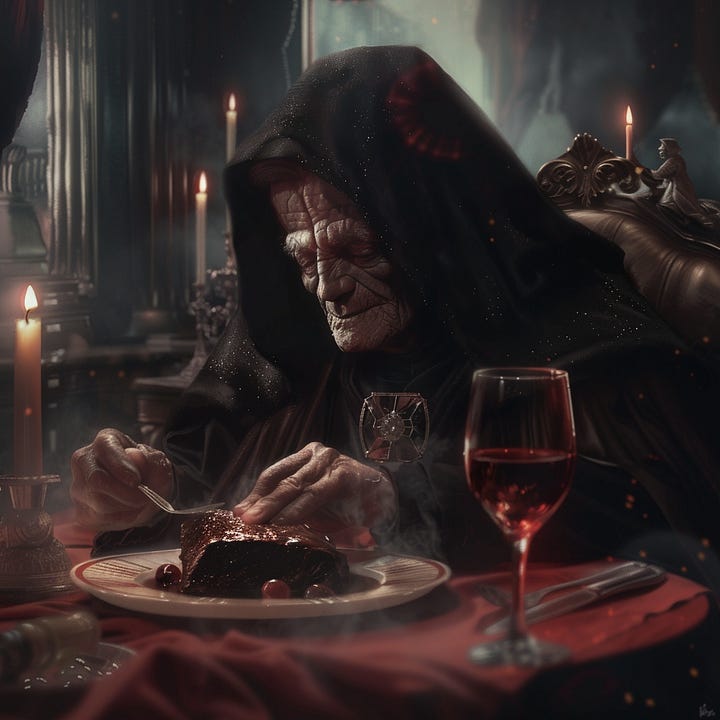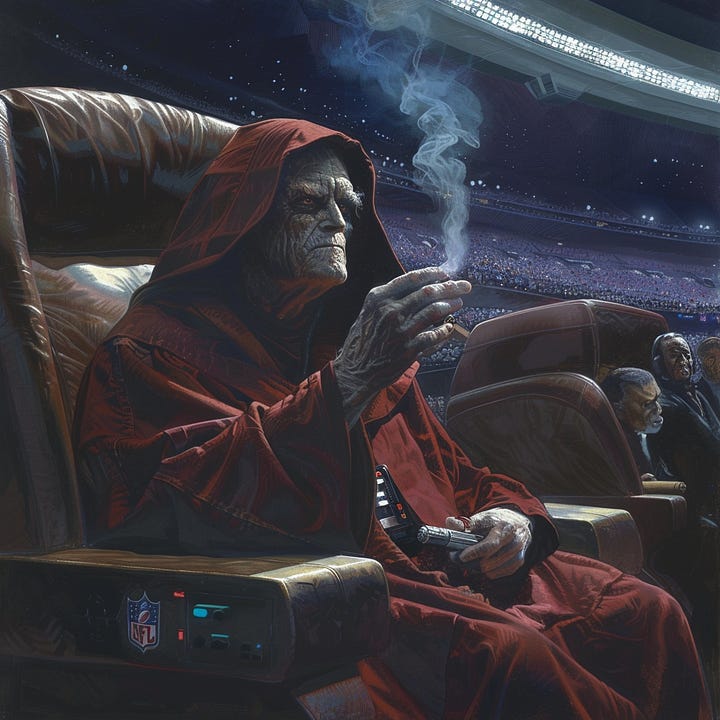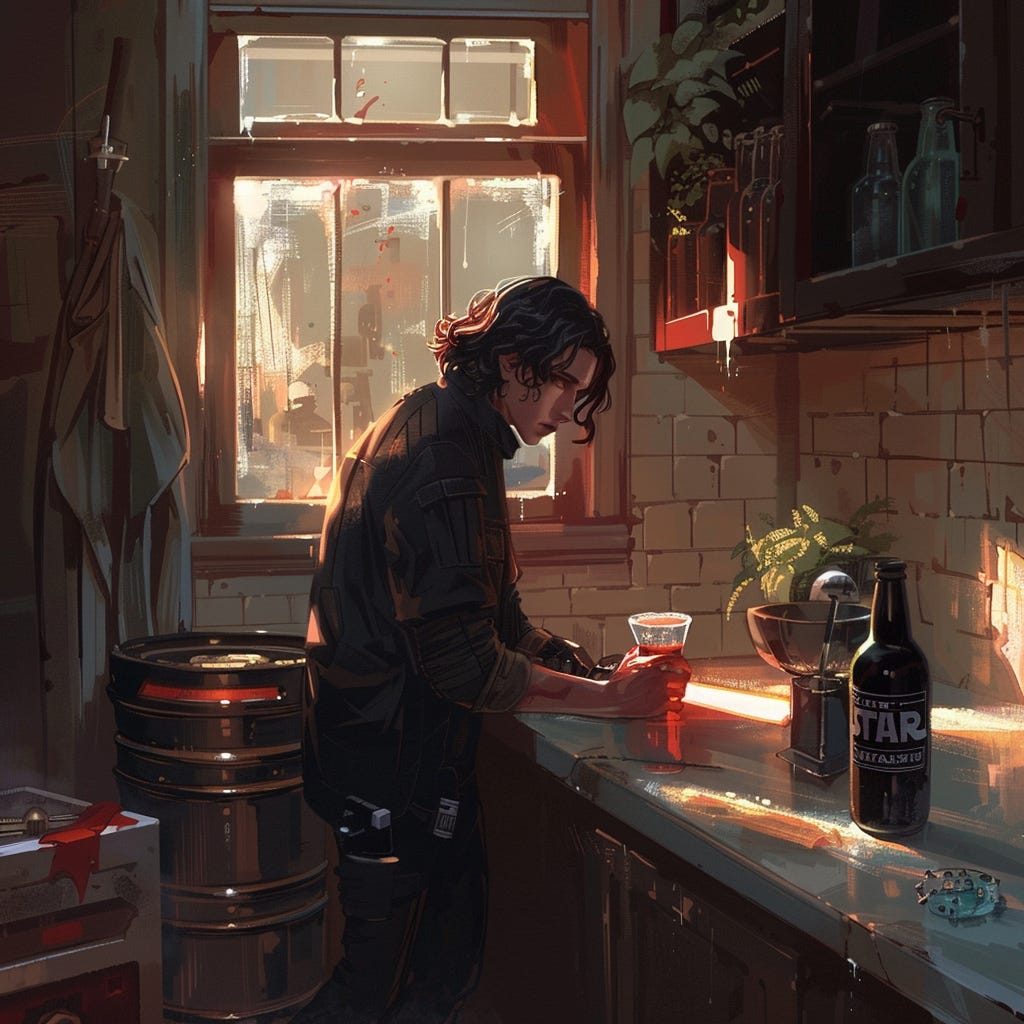Imaginary Evils
Return of the Geek
I haven’t done enough talking about comic books, science fiction and so on lately in this newsletter. That seems odd considering that I can whip off a detailed commentary on the narrative intricacies and shortcomings of Omega, the Unknown in relation to Steve Gerber’s uneven oeuvre at the least opportunity on an appropriate subreddit.
So let me react here to a really good essay by Joshua Rivera on Polygon talking about how one of the biggest problems with Star Wars is that the Sith are boring as villains and antagonists. I couldn’t possibly agree more, and curiously, it’s something I was kind of ranting about myself on Reddit only a few days ago.
On Reddit, what I was responding to was a poster who asked, “So, really, why does Emperor Palpatine want to rule the galaxy?” There are few good answers to this question in canon within the sprawling oeuvre of Star Wars.
That’s only partly a function of Palpatine, aka “Darth Sidious”, largely being a distant plot device and background character until Return of the Jedi, then being a really important and present plot device in the prequels, and then being an unbelievable narrative catastrophe in J.J. Abrams’ miserable shitfest Rise of Skywalker. Dave Filoni has done his usual canon-scavenger best in the animated series to make up for George Lucas’ manifest failures as a world-builder and storyteller, but it’s really not enough.
The problem is really not with Palpatine as Emperor, where he’s fine, but his earlier incarnation as Darth Sidious the schemer, seeking power through a complex multi-pronged conspiracy, through the prequels, Filoni’s Clone Wars and every other pre-OT Star Wars product. It’s plain what Sidious wants—and his scene-chewing delight in his fight with Yoda in the Senate chambers in The Revenge of the Sith is evidence that his desire for it is visceral. (Along with “ULTIMATE POWAAAAH!” earlier in the film.) He wants to destroy the Jedi in the most humiliating and complete way possible and, well, rule the galaxy.
If you are a devotee of every bit of Star Wars product ever produced, much of it technically no longer canonical, you know that the Sith used to rival the Jedi for power an even longer-time ago in that far-away galaxy, and that the Sith fell because of in-fighting and dedicated Jedi resistance. Which says very little about motivation, which is what Rivera goes after. The Sith are supposed to be evil people motivated by rage and anger and a desire for power, but why?
Compare it to this planet in our own galaxy. In real life, why do people want to be authoritarians and rule over others, and why do some people support them in that quest?
The authoritarian is sometimes someone who starts with an ambition to heal a divided society, overcome disorder and civil war, to use strength to restructure a failed government or to destroy a previous authoritarian or warlord. Many authoritarians retain a sense that what they’re doing is noble or righteous, a temporary necessity rooted in an urgent need. (Indeed, it’s really rare to find real-life people who self-consciously take pleasure in their own wickedness and cruelty, and most of those aren’t tyrants or authoritarians but instead small and awful kinds of lone killers.)
Sometimes the eventual ruler doesn’t set out to be an authoritarian, but instead is one among many people in a group that is pursuing a strong spiritual, ideological, cultural or social vision. The group finds that the only way to protect themselves from a dominant orthodoxy is to seize power for themselves and then to vest it in their most charismatic or willful member. (Or they go elsewhere and establish power to defend themselves against the orthodoxy.)
Sometimes a single person is picked out as a figurehead by a class or group or institution which is defending its existing oligarchic claim over a disproportionate share of resources and wealth. The authoritarian in this case is a tool, a weapon, and their personal motivation may not matter very much. (We have boundless real-world and fictional examples of kings and dictators who do not really rule or want to rule, but are kept at the top by viziers, regents, ministers, generals and so on.)
What about individuals whose personal motivations for seeking power do matter? There’s one group where that’s just about a personalized version of pursuing an ideology or doctrine where the authoritarian figure subordinates or transforms an existing political organization or movement to that personal doctrine, or perhaps intensifies some features of an existing movement to align with personal zealotry.
Another is a dramatic version of social mobility: the authoritarian is from a marginal or oppressed social class and is both rising through the existing hierarchy and overturning it in a purely personal sense all at once. That often aligns with something like vengeance: the authoritarian is scourging people, classes or institutions that he or she associates with their personal suffering earlier in life, and is mobilizing wider social resentments in their own person rather than in a revolutionary mass movement. Sometimes the authoritarian is also revenging themselves for their own past errors in judgment or on overcoming suffering at the hands of enemies after losing a previous struggle.
Finally, there is the kind of authoritarian who is a narcissist, hedonist and sociopath, who pursues absolute power in order to remove any external constraint on the pursuit of their own pleasure or the exercise of their own whimsy. This kind of authoritarian scarcely cares about what is done in their name outside of the palace, the court, the headquarters: all that matters is absolute obedience within their own proximate world and absolute protection from any constraining power outside of it.
These are not exclusive motivations—the unwitting figurehead can turn into the pampered narcissist, the member of an exclusive ideological group can turn into the scourging zealot, the ambitious outsider rising rapidly through the ranks can start as a tool of oligarchs and become their deadliest enemy on achieving power. You don’t have to look any further than the GOP’s presidential candidate in 2024 to see that narcissism, sociopathy, ideological purity, and being a tool of both malign oligarchs and revenge-seeking outsiders can be bundled into a single person’s quest for authoritarian power.
As Rivera observes, the Sith are basically Jedi who like to cosplay at being evil. They’re punk Jedi who dress up all in black and take scary names. They’re meritocrats in the sense that they train obsessively either in combat or in more esoteric forms of power derived from the Force not just to beat the Jedi but in order to dominate their apprentices or overthrow their masters. But like the Jedi, they’re a bunch of killjoy ascetics. For the most part they seem to want power in a purely abstract and cosmic way, to blow up planets and build huge militaries, or in a purely personal way, to kill underlings with impunity and to win fights.
Even when it’s about winning fights, they don’t seem to be having any fun, with the possible exception of Darth Maul, who really seemed to be enjoying showing off his martial prowess in The Phantom Menace. (Which in turn I think explains his popularity and why his duel is the best in all of Star Wars: because he actually has a motivation and it’s actually viscerally on screen.)
Why does Palpatine want to rule? He doesn’t seem to take any pleasure in power physically, socially, culturally. He hangs out in dreary, bare rooms with silent guards. He doesn’t seem to have an agenda for the galaxy other than domination—even his sense of “order” is largely just about squashing threats to his personal authority over the galaxy. He’s not teaching Sith philosophy or rebuilding past the Rule of Two. It’s actually hard to imagine what he does as Emperor when there’s no Luke Skywalker to laugh evilly at or no orders to convey to Darth Vader. He doesn’t even get to scheme the way he used to as Sidious for the most part. (Marvel’s more recent in-canon comics do add some of that element to his daily calendar, however.) The few Jedi he hasn’t managed to revenge himself against are on the run or in hiding, and are at best a couple of breadcrumbs after a feast. But we’re not even clear how much that revenge is something personally felt or why it fuels his power. Did a Jedi hurt him when he was a wee little Sith? Or is this all just book-learning and stories he heard at the knee of his own Sith master? The Sith are supposed to be about anger, rage and desire. What does the most powerful Sith in-canon feel anger, rage and desire about? How does that fuel his particular quest for power, quite different from that of his own master?


Anakin Skywalker gets a bit closer to the anger part, but it’s mostly about losing (twice) to his former teacher and being stuck in a clumsy mobile iron lung as a result, along with being responsible for his lover’s death. At least Anakin had actual passion: he’s the only Sith we’ve seen who felt desire of any tangible kind, who was driven towards the Sith because of the ideological rigidity of the Jedi. We’ve never seen a Sith who wants money or sex or fun, who collects beautiful artworks in a secret museum and goes to the best restaurants in the galaxy, who gets pleasure from emotional cruelty to people they know or likes to manipulate and cause trouble for the pure malicious pleasure of it.
Anakin’s nephew, Ben Solo aka Kylo Ren, also has some humanity, but mostly not in what he actually does as an evil Sith-wannabee but in the desperation of his desire to achieve that kind of abstract evil. He comes off as a fraternity pledge who is screwing up his courage to get through all of the hazing rituals. He hasn’t realized yet that the Skull and Bones HQ when you turn on the lights and put your clothes back on is just kind of lame, old-fashioned and shabby and all you get for murdering your dad and trying to murder your uncle is to be a senior partner at Zombie Palpatine’s hedge fund that’s going to blow up the entire galaxy just because whatever.
Essentially the Sith in Star Wars are showy symbols of a theatrical evil, not actual characters. They’re devils who tempt and menace, not motivated people driven by some kind of interior drive or by some kind of richly developed external structure or purpose. Palpatine is Lucifer before “Paradise Lost”, a plot device and metaphysical abstraction, a force (so to speak) that disseminates evil but might as well be fully off-screen, as any direct appearance diminishes him or makes him seem silly.
Evil in Star Wars has been in the Empire itself, primarily in its military apparatus. And even that was badly underdeveloped until the Disney + series Andor, whose villains have real motivations, produce actual sympathy from the viewer, and thus are genuinely awful when they do the evil that they do, or attempt to do. And thus we emotionally cheer for Andor’s protagonists when they escape from prison (many directly into death) or quite intimately attempt to beat individual Imperial soldiers to death with whatever weapons come to hand. I suppose I’ve vaguely cheered for Obi-Wan, Luke and Rey to beat their respective Sith antagonists, but that was de rigeur. Not the least because they have to be such stiffs about it that they’re not even allowed to be genuinely mad over the bad guys committing mass murder on a galactic scale and blowing up whole planets. It’s impossible to imagine any Jedi giving a speech like Maarva Carassi Andor’s in the last episode of the series.
The only other bad guy in Star Wars who seems to have real motivations for his wickedness is Jabba the Hutt, which is why it was thrilling to see him strangled to death by Princess Leia. Why haven’t any of the Sith been more like Jabba? Surely somebody who had that degree of power would also have that kind of motivated, visceral sadism and hedonism? (Tatooine has become a tame playground since that point in Star Wars media.)
Star Wars needs a new coat of paint in so many ways, but this might be the top of the list. Its heroes and good guys (even the scoundrels) would be more compelling protagonists if they had more interesting and more motivated enemies.
Andor logo credit: By Scholarlyhexes - Own work, CC BY-SA 4.0, https://commons.wikimedia.org/w/index.php?curid=118447934




I do not follow the Star Wars world. But, I have in the past few weeks been rewatching I, Claudius, and it is fascinating in its asking why someone would want power, what moves Livia, Augustus, Tiberius?